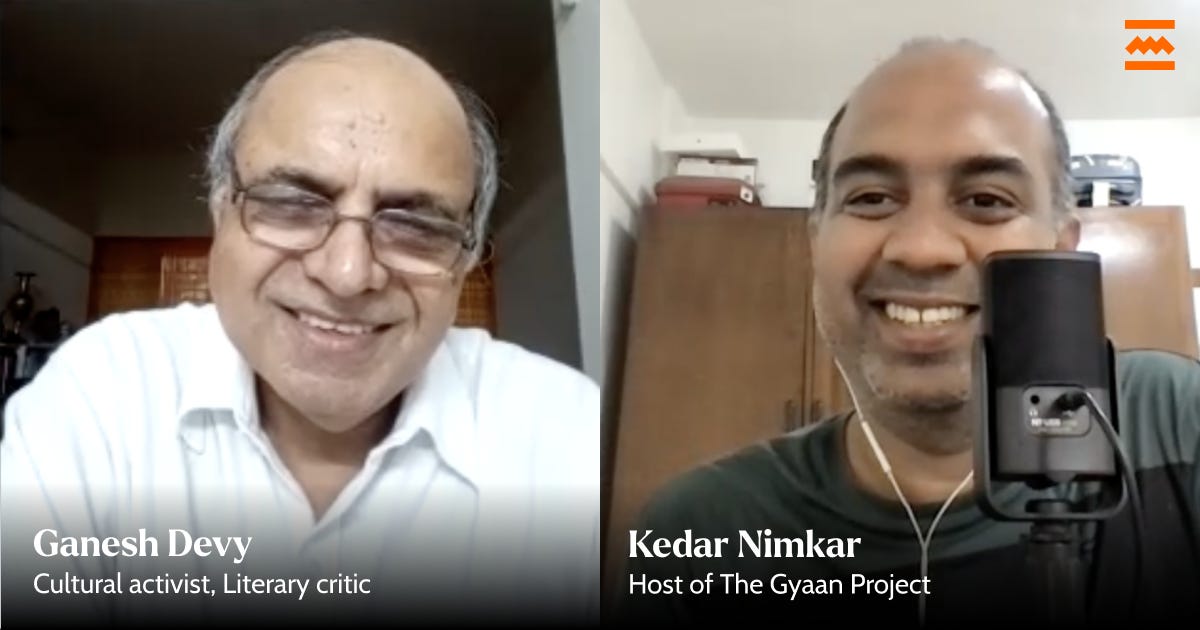Is Hindi a language? 4 Lessons on language from Ganesh Devy
Explore how languages evolve, vanish and shape identity with Ganesh Devy. A deep dive into India's linguistic diversity, grammar and philosophical meaning.
Frankly, I couldn’t stop at just four questions from this rich conversation with Ganesh Devy. We spoke about how slang isn’t dirty, but a secret code. How English barely survived for two centuries before it was rescued by poets. How ants communicate, how Hindi is more arrangement than language, and so much more. Honestly, it’s best to listen to the full episode (formerly ▶️ Audiogyan Ep.221). But still… here are the four that stayed with me.
Let us begin with introduction. Ganesh Devy is a critic, thinker, editor, educator, and a cultural activist. He is the founder of the People’s Linguistic Survey of India, which documented over 700 Indian languages. He has worked for decades to protect dying languages and tribal knowledge. Devy has received the Padma Shri and the Sahitya Akademi Award (which he returned) for his contribution to literature and language studies.
1️⃣ How do you define language?
Short Answer: Consciousness connector.
Long Answer: There are multiple ways to define language depending on your perspective. Some study it as a material system of signs, while others see it as a human invention for communication (connecting one consciousness to another). Grammarians define language as that which has grammar, structural linguists view it as arbitrarily created signs, and philosophers see it as carriers of meaning.
If you wish to explore various facets of Indian Languages, do check out India in Pixels
2️⃣ How are standard languages and dialects determined?
Short Answer: Power and not grammar
Long Answer: There's no scientific basis for "standard" language, it's a sociological construct based on identity and power. When people migrate to new areas, settled communities, mark newcomers as "others" (partly through language differences). These outsiders are labeled as dialect users rather than standard language speakers. This identification isn't linguistic but reflects sociological bias. Every language is equally standard because all serve the same communication purpose. Words are like conveyor belts carrying meaning, and no version is inherently superior to another.
“A language is a dialect with an army and navy” - Max Weinrich (The Geography of Words)
3️⃣ Does sound carry meaning?
Short Answer: Boom or bloom?
Long Answer: Indian philosophers debated this over a thousand years ago. Bhartṛhari(5th century) said meaning is a sphoṭa (boom), a sudden burst that happens when thought meets language, like a reflection in a river. He believed meaning is a momentary illusion. A few centuries later Anandavardhana (7th century) disagreed. He said meaning already exists in our mind before we speak. Sound just makes it visible (bloom). One saw meaning as a flash. The other saw it as a seed waiting to grow.
Indian Knowledge Tradition and System (IKS on Language and Grammar)
4️⃣ Is Hindi really a single language?
Short Answer: It’s more of a patchwork.
Long Answer : Hindi is more of an arrangement than a pure language. It was formalised in the early 1800s when the British needed language primers for their officers. John Gilchrist compiled one such primers and called it “Hindi”. Before that, no one used that word for their speech. People spoke Awadhi, Braj, Bhojpuri, and others. Even today, the Indian census lumps 65 different languages under the Hindi label (including Bundeli, Angika, and even Pawari). That’s why Hindi’s population keeps going up in census reports. So, Hindi survives because it accommodates. It’s a beautiful, humanitarian patchwork. But we must recognise it for what it is, an inclusive political and social arrangement, not a single linguistic system.
Do you know who is known as father of Modern Hindi Literature? Bhartendu-Harishchandra
Towards the end of the conversation Ganesh Devy pointed out that, though the number of speakers of language are increasing, vocabulary is shrinking. This narrowing of expression limits our creativity and understanding. To help avert this, let’s make a conscious effort to learn new words, explore regional dialects, and use language in richer, more imaginative ways. The more words we know and use, the more connected, creative, and empathetic we become.
One of TGP’s humble effort in this direction has been “Bharat ki Bhashayen.” Do check it out. 👇 Please do comment if you have more episodes on language which I can add to the playlist.
If you are interested in listening to the full conversation with Ganesh Devy, here are the links 👉 Youtube | Substack | Spotify | ApplePodcast




